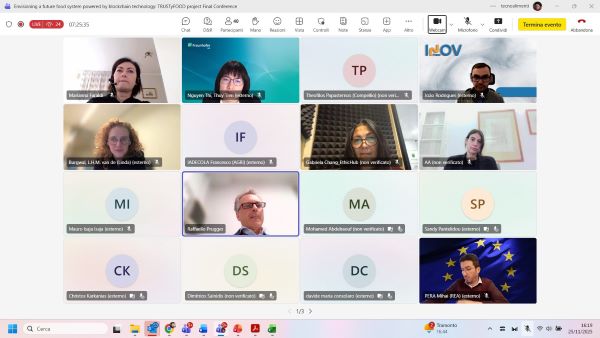
Luxembourg-based deeptech company Compellio SA has announced that the partner project in which it is involved, TRUSTyFOOD, recently held its “Final Conference” online, marking the end of more than three years of blockchain research in the agri-food sector.
Held on Tuesday 25 November 2025, the event brought together around 100 researchers, policymakers and institutional representatives to discuss the future of blockchain in the sector and responsible research practices.
TRUSTyFOOD is an EU-funded project featuring thirteen beneficiary partners across seven European countries (Luxembourg, Croatia, Germany, Greece, Italy, the Netherlands and Portugal) and one third country (Egypt).
Raffaello Prugger, TRUSTyFOOD project coordinator, highlighted: “The TRUSTyFOOD Final Conference marks an important milestone in defining the path for applying blockchain technology in the agri-food sector. It concludes a journey aimed at turning the hype surrounding blockchain into a concrete vision for the future, while outlining practical steps to make its implementation feasible in the short term. The comprehensive framework developed throughout the project - verified across diverse application contexts and refined through extensive stakeholder engagement - provided a solid foundation for ongoing progress, ultimately culminating in the Research and Innovation (R&I) Roadmap.”
The consortium noted that blockchain in the agri-food sector mainly functions as a secure and tamper-proof ledger to record and share data among multiple parties, providing value where immutability, transparency and accountability are essential. However, researchers also mentioned that adoption remains limited by several interconnected challenges. Further investment in research and innovation is needed to overcome technical barriers, explore new use cases and generate stronger evidence of blockchain’s economic and social value.
Key priorities highlighted during the conference included strengthening digital skills, improving interoperability, ensuring data credibility and developing business models that support fair value distribution across the supply chain. Participants also highlighted the need for supportive regulation, including legal clarity on smart contracts, GDPR compliance and cross-border data governance. Regulation should further promote inclusivity so that smallholders, cooperatives and small and medium-sized enterprises (SMEs) are not excluded due to cost or technological barriers.
The conference continued with recommendations to support blockchain uptake in the agri-food sector. Participants called for blockchain to be recognised as a Key Enabling Technology (KET) for resilience and integrated into EU digital, agricultural and sustainability policies. They also highlighted the need for combined investment in research and regulation to ensure innovation and legal certainty, as well as inclusive governance models that empower farmers, SMEs and consumers in shaping blockchain solutions.
The event concluded with two speeches with an international focus. The first one, delivered by Aliaa Ibrahim, NSCE Project Manager, underlined the importance of international cooperation in globalised supply chains to mainstream blockchain as a global public good and to align standards across borders. In the second speech, Gabriela Chang Valdovinos, co-founder of EthicHub, focused on the need to design inclusive systems that use programmable incentives to support smallholder farmers, even when they do not interact directly with the technology.
The project’s final results included a set of documents co-created with stakeholders. These comprise:
- R&I Roadmap for blockchain technologies in the agri-food sector;
- a policy brief outlining short-term policy recommendations;
- series of white papers on topics such as standardisation, interoperability and skills development;
- Framework of Services (FoS), a digital knowledge base and collaboration platform designed as a one-stop shop for stakeholders seeking tools, guidelines and insights on blockchain implementation in the food supply chain.
EO









